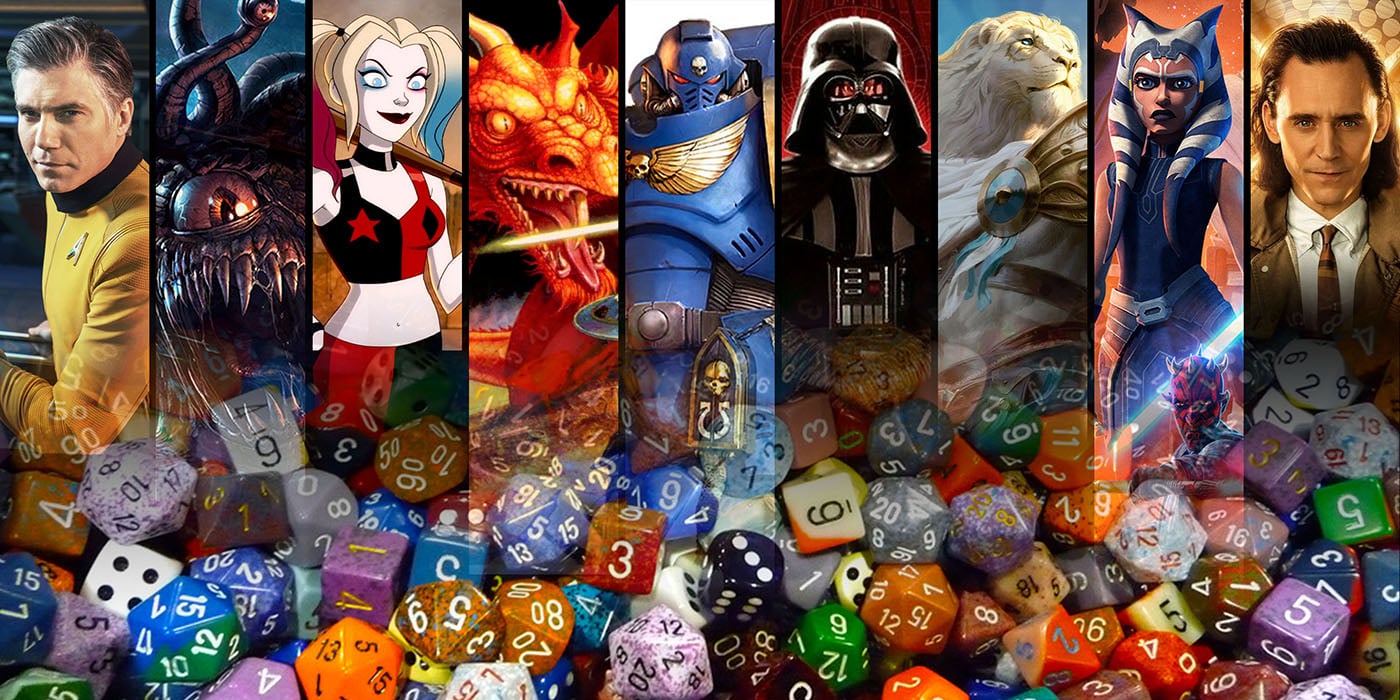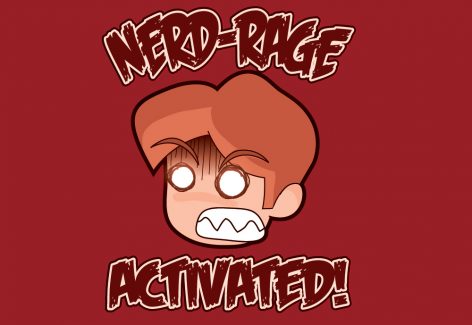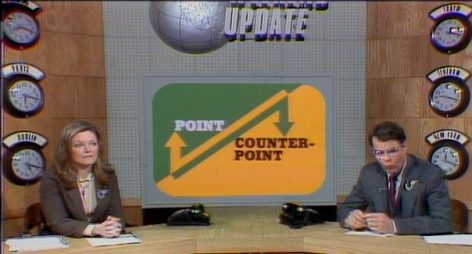Deep Thought: Why Tabletop Gamers Lose It


A professional digs into the root of why players lose thier minds at the tabletop.
A UX Analysis of Tilting
Hey guys, it’s Adam from TheDiceAbide and RUMBL. In my non-gaming life, I’m a User Experience (UX) Designer. For those who don’t know what that it, it means I analyze and design how people experience products, typically software and hardware, but UX Designers are employed in all kinds of industries (think about how every element of Disneyland was laid out with a purpose). This background makes me look at things a bit differently from time to time, I spend hours pondering weird details or products and places that most people wouldn’t bother with, and when I see something occur over and over again, I try and see if there is something bigger at work.
Lately, I’ve been introduced to the concept of “tilting” by my local Guild Ball players. For those who don’t know, Tilting is a term, popular among Warmachine players, to describe losing your temper and getting angry while playing a miniatures game. In the 20 years of experience I have playing with miniature murder dolls, I’ve never heard this expression until recently, and only hear of it in the context of a game of Warmachine, and occasionally Guild Ball (which draws in a lot of the WMH community).
After explaining the concept to my wife (who is also a designer) we decided to get to the bottom of why it seems to be something so common in one game that it has a term, and yet in other games, like Infinity or 40k, it doesn’t seem to be that much of an issue. She doesn’t have experience with miniature games, so it took some explaining of the core mechanics of each, and a few intoxicated nights of plotting out different theories to come up with one that seemed to fit the bill.
NOTE: Before you read on, remember that this is all just theory, and I’m not advocating that one game may be intrinsically better or worse than any other, rather, it’s just me trying to make sense of it all.
User Agency
User Agency is a term used in UX design to describe the ability for a user to control their experience. Often times this can mean that a user is able to customize their experience, or choose how they solve a problem within a bit of software. When people are forced to conform, and perform tasks within software in a specific way, they could feel helpless, or powerless to control their own experience. When a user has more agency, they are free to pick and choose how to do something, and react to their experience in a way that they are most comfortable with… Something else to think about is perceived agency and actual agency. With perceived agency, a player feels that they had a direct impact on the result (think about taking armor saves in 40k), while with actual agency, players are making active decisions to affect an outcome (like charge reactions in WHFB).
So how does User Agency relate to miniature games?
I Go, You Go: Low User Agency
Traditional miniature wargames are designed with the concept of players each having a turn. Quite often, like in Warhammer and Warmachine, one player will be able to activate their entire army, perform all the tasks they want to do, and then it become their opponents turn to do the same. In these games, during your opponents turn, there is typically very little for you to do, and it is somewhat common to feel like there is nothing you could have done when your opponent is kicking your butt. In Warmachine in particular, it is not uncommon to do nothing except check off boxes of damage. Since all the dice rolled are done by the attacker, when it is not your turn, you are at the mercy of your opponent, watching helplessly as your army gets crushed, hoping you have enough left to recuperate from the attack. This kind of game play can create a very competitive, it’s you VS me environment, instead of a situation where the game feels like a collaborative effort.
Warhammer 40k (and old WHFB), is slightly different, since even during your opponents turn, you still have the occasional decision to make, and dice to roll, all of which can influence the outcome of the game. Statistically speaking, it makes no difference who is rolling the dice, but when YOU roll the dice, you feel like you influenced the outcome. Imagine playing 40k, but your armor saves were rolled on by the opponent. If your opponent were getting some hot rolls, your blame would often be rested on the opponent or their cheating dice, while currently in 40k, if you roll badly, it was your own (or your dice) fault for failing to roll the way you *should* have. Because of this, Warhammer 40k (and similar games) tend to feel a bit more like you are in control of the outcome, despite it being statistically irrelevant. Presumably, this is why 40k players can still often get quite frustrated, but it doesn’t seem to happen often enough in the culture to be given a unique title.
Mixed Activation: Moderate User Agency
Some newer games are experimenting with the way that Activation traditionally works. The two that come to my head first, are the ones I have experience with, Guild Ball and Beyond the Gates of Antares (though Bolt Action works in the same way). In these games, your turn isn’t dominated by waiting for your opponent to perform every little trick they can think of, but instead, you are alternating between players during a game turn.
Guild Ball still has some I-GO-You-GO feel to it, since the mechanics are very similar to Warmachine, but since you are only getting to activate a single model at a time, a player doesn’t have to sit idle for very long, and has the opportunity to respond to an enemy plan that may be coming to fruition. From what I’ve seen of the game, and it’s players, I would suspect that Tilting wouldn’t be a term used in the community, if it wasn’t for the impact on the game by it’s WMH playerbase. Not saying people don’t get frustrated, it just doesn’t seem to happen as often, or escalate as much.
Beyond the Gates of Antares and Bolt Action have a unique system to break down I go, You go, in that each player places a dice in a bag for each unit in their army. These dice are then randomly drawn to see who gets the next activation. This part of the game helps break down the expectation of going next, but if you really need it, you can feel let down, and experience a bit of frustration. At the same time though, it’s very rare that your opponent will get their full turn before you get a chance to attack, though not impossible. Additionally, during your opponents turn, you have the opportunity to react to an enemy order, and you get to make armour saves to damage you take. The combination of the two of these, gives the user the ability, both actual and perceived, to affect the outcome of the game, during the opponents turn. This is a tremendous increase in user agency over a purely I-GO-You-GO, and seems to create a less frustrated user base.
Blended Activation: High User Agency
The only example of this that I am aware of first hand is Infinity. In this game, everything your opponent does, you get an opportunity to react to, and often times this means both players are rolling dice against each other to determine the outcome. There are very few situations where a player is left with no recourse, and typically those situations are the result of a well executed maneuver by the other player. Since you can typically respond to almost everything your opponent does, throughout the entire game, you are making decisions which directly affect the outcome of the situation, and the survival of your units. When you make a decision that directly opposes your opponents attempts, you both roll dice, whoever wins the roll off gets their way. If the enemy shoots you, you shoot them back (though you are not typically as effective when responding).
This kind of game play, also means it’s very important what someone’s intention with an action was. Since there is a concept of “public information” in Infinity, you should never be surprised with a model’s Line of Sight, and if it’s unclear, people most often revert to what the obvious intention was. An example would be if a model moves out around the corner enough to see an enemy, before ducking back out of line of sight, both players then roll their dice and continue. If during the next turn the opponent discovers that actually the model was still a sliver in LOS after ducking back, most often people will say that there is no LOS, or nudge the model back far enough to get out of sight, as that was the intention at the time. This kind of communication, as well as turn structure, where you are always making decisions, creates the environment that has a lot of user agency.
So what does all that mean? Pretty simply, when people have the most control of their outcome (perceived or real), they feel less frustrated by the results. Never have I seen a game of Infinity devolve into shouting, with tempers flaring, even in the most competitive tournaments, and my theory is that it is because the increased user agency, with the collaborative game play. I’m not trying to say that one game system is better than another (though I do have my preferences), but instead I’m hoping that by people understanding the nature of their experience in how a game is designed, that they can understand their own, or their opponents behavior, and possibly even change it, if needed.
What do you think? Do you have other theories?
Shameless Plug Time!
If you guys haven’t heard already, I’m the cofounder of a new app called RUMBL. I’ve put my talents to work with a few other fellow gamers to create an online resource to find other players, arrange games, and record the results. This however is just the beginning and we will continue to expand RUMBL until it’s the go-to resource for people who ACTUALLY play games. With awesome tools like store finders, club registration and event tracking, coming in the future, you’ll always have your finger on the pulse of your local gaming community.
We have recently launched our beta and are looking to gather as much user feedback as possible, so please check it out and play some games!












